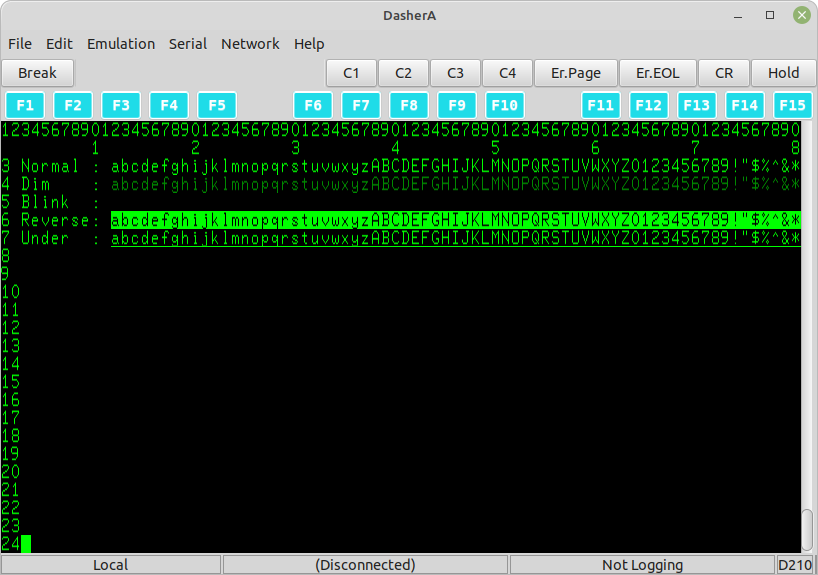DasherA is a free terminal emulator for Data General DASHER series character-based terminals.
It is written in GNU Ada using the GtkAda toolkit and should run on all common platforms targeted by those tools. Other platforms satisfying the build requirements (see below) may also work - eg. it builds and runs successfully on Raspbian GNU/Linux version 11 32-bit.
- DASHER D200 & D210 Emulation
- Serial interface support at 300, 1200, 2400, 9600, 19200 & 38400 baud, 7 or 8 data bits, no/odd/even parity, 1 or 2 stop bits (defaults to DG-standard: 9600, 8, n, 1)
- BREAK key support for serial interface - permits use as master console
- Network Interface (Telnet) support
- May specify
-host host:porton command line - Reverse video, blinking, dim and underlined characters
- Pixel-for-pixel copy of D410 character set
- 15 (plus Ctrl & Shift) DASHER Function keys, Erase Page, Erase EOL, Hold, and Break keys
- C1, C2, C3 and C4 DASHER Custom keys (plus shifted versions)
- Loadable function-key templates (BROWSE, SED and SMI provided as examples)
- 1000-line scrollable terminal history
- Session logging to file
- Various terminal widths, heights and zoom-levels available
- Support for mini-Expect scripts to automate some tasks see Wiki
- Paste from system Clipboard
- XMODEM-CRC file send and receive with short (128) or long (1024) packets
Here is the full Implementation Chart for DasherA.
DasherA is hosted on GitHub.
A binary version for 64-bit GNU/Linux may be available as part of a release.
You will need the Ada compiler chain, and the GtkAda (libgtkada-dev) libraries installed.
On modern (2022) Debian-based systems the gnat, gprbuild, and libgtkada19-dev packages work just fine.
- Unpack (or
git clone) DasherA andcdinto its directory - Create an
objdirectory if it does not already exist - Build with
gprbuild
The default build is with debugging and without optimisation. Append -Xmode=release to the build command for an optimised build.
./dashera
Append -h to see all options.
You need the DASHER font and icon to be in the same directory as the executable (for now).
- The DASHER 'CR' (carriage-return, no line-feed) is available from both the GUI 'CR' button and the numeric keypad enter key (if present).
- The DASHER 'Hold' key is available from both the GUI 'Hold' button and the PC-style 'Pause' button (if present).
- The BELL sound will only work if DasherA is started from a terminal supporting such an event, or if the windowing system permits Window Beeps. In Mint 20, the critical setting is Accessibility => Keyboard => Event Feedback => Sound to use for window alerts.
